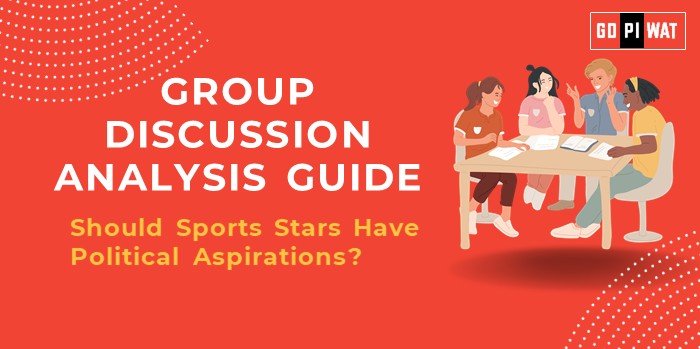📋 Group Discussion (GD) Analysis Guide
Should Sports Stars Have Political Aspirations?
🌐 Introduction to the Topic
Sports personalities often possess mass appeal and public trust, traits that can seamlessly transition into political influence. Globally, examples like Manny Pacquiao in the Philippines showcase how sports stars impact politics.
Historically, many athletes have ventured into politics, leveraging their popularity to bring attention to social issues. In India, stars like Navjot Singh Sidhu and Rajyavardhan Singh Rathore illustrate this trend. However, the transition often raises questions about governance expertise and effective policymaking.
📊 Quick Facts and Key Statistics
- Global Examples: Manny Pacquiao (Philippines), George Weah (Liberia, former footballer turned president).
- Indian Scenario: 10+ Indian sports stars have held public office in the past decade.
- Popularity Metrics: Sports stars in India often have social media followings exceeding 10 million, enhancing outreach potential.
- Criticism Data: Surveys indicate 40% of respondents doubt athletes’ governance expertise.
🎯 Stakeholders and Their Roles
- Sports Stars: Leverage public trust to influence policies and inspire action.
- Political Parties: Seek high-profile candidates to strengthen vote banks.
- Citizens: View athletes as relatable, credible leaders.
- Civil Society: Question the prioritization of celebrity appeal over competence.
🏆 Achievements and Challenges
Achievements:
- Athletes often champion underrepresented causes like education and health (e.g., Mary Kom’s initiatives in the Northeast).
- Global recognition aids in diplomatic ties, especially in sports-centric countries.
- Example: George Weah effectively addressed poverty in Liberia through targeted policies.
Challenges:
- Lack of governance experience leads to ineffective policymaking.
- Focus on sports may overshadow broader national issues.
Global Comparisons:
- While Liberia embraced George Weah’s leadership, other nations have seen mixed results, such as Arnold Schwarzenegger’s tenure in California.
Case Studies:
- Rajyavardhan Singh Rathore’s success in promoting sports development in India highlights potential benefits.
📌 Structured Arguments for Discussion
- Supporting Stance: “Sports stars possess charisma and public trust, essential for effective leadership and advocacy.”
- Opposing Stance: “Governance demands expertise that athletes often lack, risking ineffective leadership.”
- Balanced Perspective: “While sports stars bring visibility, they must ensure governance competence through proper training.”
📖 Effective Discussion Approaches
Opening Approaches:
- Start with impactful global examples (e.g., George Weah’s presidency).
- Cite data on sports stars’ influence (e.g., social media reach).
Counter-Argument Handling:
- Highlight the need for governance training for athletes entering politics.
- Acknowledge positive cases but stress limitations.
🔍 Strategic Analysis of Strengths and Weaknesses
- Strengths: Public trust, mass appeal, relatability.
- Weaknesses: Lack of expertise, susceptibility to populism.
- Opportunities: Address niche issues (sports, youth empowerment).
- Threats: Potential misuse of popularity for political gain.
🔗 Connecting with B-School Applications
Real-World Applications: Policy design for leveraging celebrity influence in social campaigns.
Sample Interview Questions:
- “How can sports stars balance their dual roles in sports and politics?”
- “What policies can enhance the role of athletes in governance?”
Insights for B-School Students: Explore leadership models, stakeholder engagement, and public communication strategies.


